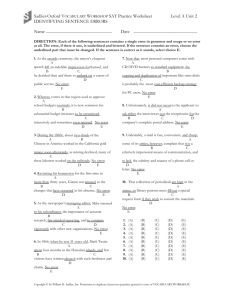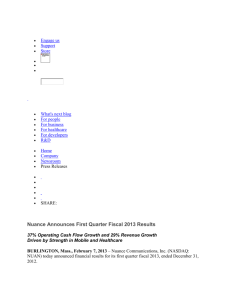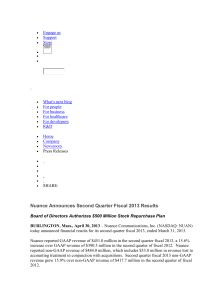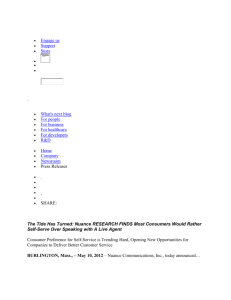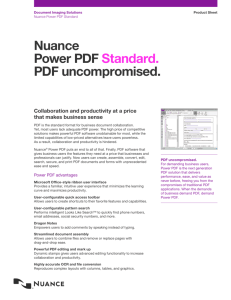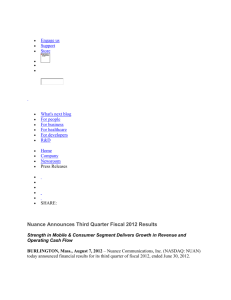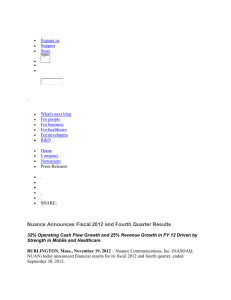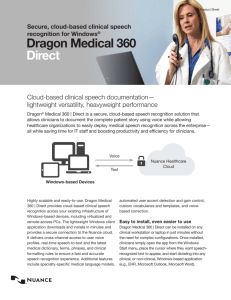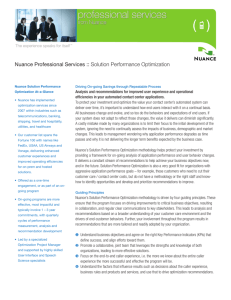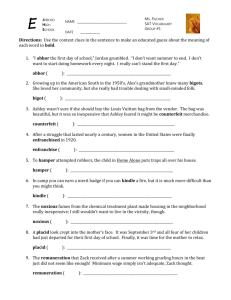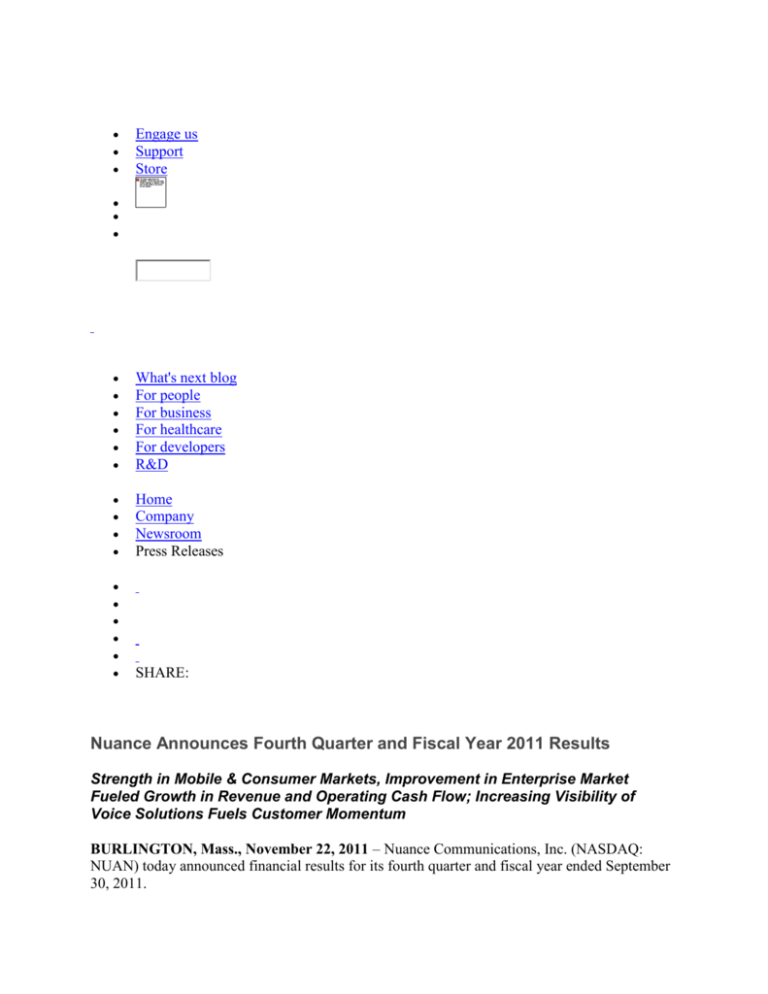
Engage us
Support
Store
What's next blog
For people
For business
For healthcare
For developers
R&D
Home
Company
Newsroom
Press Releases
SHARE:
Nuance Announces Fourth Quarter and Fiscal Year 2011 Results
Strength in Mobile & Consumer Markets, Improvement in Enterprise Market
Fueled Growth in Revenue and Operating Cash Flow; Increasing Visibility of
Voice Solutions Fuels Customer Momentum
BURLINGTON, Mass., November 22, 2011 – Nuance Communications, Inc. (NASDAQ:
NUAN) today announced financial results for its fourth quarter and fiscal year ended September
30, 2011.
Nuance reported GAAP revenue of $367.0 million in the fourth quarter of fiscal 2011, an 18.5%
increase over GAAP revenue of $309.8 million in the fourth quarter of fiscal 2010. Nuance
reported non-GAAP revenue of $399.5 million, which includes $32.5 million in revenue lost to
accounting treatment in conjunction with acquisitions. Fourth quarter fiscal 2011 non-GAAP
revenue grew 23.0% over non-GAAP revenue of $324.9 million in the same quarter last year.
In the fourth quarter of fiscal 2011, Nuance recognized GAAP net loss of ($5.1) million, or
($0.02) per share, compared with GAAP net income of $2.1 million, or $0.01 per diluted share,
in the fourth quarter of fiscal 2010. In the fourth quarter of fiscal 2011, Nuance reported nonGAAP net income of $133.5 million, or $0.42 per diluted share, compared to non-GAAP net
income of $100.3 million, or $0.33 per diluted share, in the fourth quarter of fiscal 2010.
Nuance’s fourth quarter fiscal 2011 non-GAAP operating margin was 36.1%, up from 35.2% in
the fourth quarter of fiscal 2010. Nuance reported cash flow from operations of $97.9 million in
the fourth quarter of fiscal 2011, compared to $111.6 million in the fourth quarter of fiscal 2010.
In fiscal year 2011, Nuance reported GAAP revenue of $1,318.7 million, a 17.9% increase over
$1,118.9 million in fiscal 2010. The company reported non-GAAP revenue of $1,393.9 million
in fiscal 2011, which includes $75.2 million in revenue lost to accounting treatment in
conjunction with acquisitions. Fiscal 2011 non-GAAP revenue grew 16.6% over non-GAAP
revenue of $1,195.7 million in fiscal 2010.
In fiscal year 2011, Nuance recognized GAAP net income of $38.2 million, or $0.12 per diluted
share, compared with a GAAP net loss of ($19.1) million, or ($0.07) per share in fiscal 2010. In
fiscal 2011, the company recognized non-GAAP net income of $430.7 million, or $1.36 per
diluted share, compared to non-GAAP net income of $359.1 million, or $1.19 per diluted share
in fiscal 2010. Fiscal 2011 non-GAAP operating margin increased to 33.9%, compared to 33.2%
in fiscal 2010. In fiscal 2011, Nuance reported cash flow from operations of $357.4 million, a
20.6% increase over cash flow from operations of $296.3 million in fiscal 2010. Nuance ended
fiscal 2011 with a balance of cash and marketable securities of $478.5 million.
Please refer to the “Discussion of Non-GAAP Financial Measures” and to the “GAAP to NonGAAP Reconciliations,” included elsewhere in this release, for more information regarding the
company’s use of non-GAAP measures.
“In the fourth quarter, Nuance delivered 23% revenue growth, driven by strong performance in
our mobile and consumer business lines as well as improved trends in our enterprise business
line,” said Paul Ricci, chairman and CEO of Nuance. “Recent high-profile speech applications in
the smartphone market have increased interest in our solutions, from both manufacturers and
users. In fiscal 2011, Nuance delivered double-digit organic revenue growth and 21% growth in
operating cash flow. Improved momentum across our markets, as well as strong fourth quarter
bookings for our healthcare and mobile solutions, position Nuance for continued growth in fiscal
2012.”
Highlights from the quarter include:
Healthcare – For Nuance’s healthcare solutions, fourth quarter non-GAAP revenue was
$148.7 million, up 22.6%, as reported, from the same quarter last year, and FY 11 nonGAAP revenue was $526.8 million, up 17.2%, as reported, from FY 10. During the
fourth quarter, new bookings included large eScription, Dragon Medical and radiology
contracts. Key healthcare customers included Baycare, Carle Foundation, Cerner,
Diversified Radiology, FED, Kern Medical, Lahey Clinic, New Hanover, Piedmont
Healthcare, and VA Hospital.
Mobile & Consumer – For Nuance’s mobile and consumer solutions, fourth quarter
non-GAAP revenue was $118.7 million, up 31.6%, as reported, from the same quarter
last year, and FY 11 non-GAAP revenue was $393.3 million, up 27.1%, as reported, from
FY 10. Key mobile customers, new bookings or design wins in the quarter included
Amazon, CIBC, Comcast, Daimler, Diebold, Ford, Kyocera, LGE, Nokia, NTT
DoCoMo, On-Star, Renault, Samsung, Sony Ericsson, State of Maryland, Time Warner
Cable, Tom Tom, and ZTE.
Enterprise – For Nuance’s enterprise solutions, fourth quarter non-GAAP revenue was
$80.0 million, up 2.6%, as reported, from the same quarter last year, and FY 11 nonGAAP revenue was $296.4 million, up 0.1%, as reported, from FY 10. Key enterprise
customers in the quarter included Aetna, AT&T, Banco Itau, Bank of America, Blue
Cross/Blue Shield of Michigan, CIGNA, Citibank, Comcast, Energex, Farmer’s
Insurance, IBM, Kaiser Permanente, Nordea, NTT, On-Star, Standard Insurance,
Telekom Deutschland, Telenor, Telstra, USAA, US Cellular, Vodafone, and Walgreens.
Imaging – For Nuance’s document imaging solutions, fourth quarter non-GAAP revenue
was $52.1 million, up 47.2%, as reported, from the same quarter last year, and FY 11
non-GAAP revenue was $177.4 million, up 26.0% as reported, from FY 10. Nuance
achieved key fourth quarter bookings and design wins with Canon, Deloitte, Ricoh, US
Securities and Exchange Commission, Visma and Xerox.
Financial Analyst Day
Nuance has scheduled a financial analyst day in Boston, MA on Thursday, December 8, 2011
and via Webcast. For registration information, please contact kevin.faulkner@nuance.com.
Conference Call and Prepared Remarks
Nuance is providing a copy of prepared remarks in combination with its press release. These
remarks are offered to provide shareholders and analysts with additional time and detail for
analyzing results in advance of the company’s quarterly conference call. The remarks will be
available at http://www.nuance.com/earnings-results/ in conjunction with the press release.
As previously scheduled, the conference call will begin today, November 22, 2011 at 5:00 pm
EST and will include only brief comments followed by questions and answers. The prepared
remarks will not be read on the call. To access the live broadcast, please visit the Investor
Relations section of Nuance’s Website at www.nuance.com. The call can also be heard by
dialing (800) 230-1085 or (612) 288-0337 at least five minutes prior to the call and referencing
conference code 219585. A replay will be available within 24 hours of the announcement by
dialing (800) 475-6701 or (320) 365-3844 and using the access code 219585.
About Nuance Communications, Inc
Nuance Communications, Inc. (NASDAQ: NUAN) is a leading provider of voice and language
solutions for businesses and consumers around the world. Its technologies, applications and
services make the user experience more compelling by transforming the way people interact with
devices and systems. Every day, millions of users and thousands of businesses experience
Nuance’s proven applications. For more information, please visit www.nuance.com.
Trademark reference: Nuance, the Nuance logo, Dragon Medical and eScription are registered
trademarks or trademarks of Nuance Communications, Inc. or its affiliates in the United States
and/or other countries. All other trademarks referenced herein are the property of their
respective owners.
Safe Harbor and Forward-Looking Statements
Statements in this document regarding continued growth in fiscal 2012 and Nuance
managements’ future expectations, beliefs, goals, plans or prospects constitute forward-looking
statements within the meaning of the Private Securities Litigation Reform Act of 1995. Any
statements that are not statements of historical fact (including statements containing the words
“believes,” “plans,” “anticipates,” “expects,” or “estimates” or similar expressions) should also
be considered to be forward-looking statements. There are a number of important factors that
could cause actual results or events to differ materially from those indicated by such forwardlooking statements, including: fluctuations in demand for Nuance’s existing and future products;
economic conditions in the United States and abroad; Nuance’s ability to control and
successfully manage its expenses and cash position; the effects of competition, including pricing
pressure; possible defects in Nuance’s products and technologies; the ability of Nuance to
successfully integrate operations and employees of acquired businesses; the ability to realize
anticipated synergies from acquired businesses; and the other factors described in Nuance’s
annual report on Form 10-K for the fiscal year ended September 30, 2010 and Nuance’s
quarterly reports on Form 10-Q filed with the Securities and Exchange Commission. Nuance
disclaims any obligation to update any forward-looking statements as a result of developments
occurring after the date of this document.
The information included in this press release should not be viewed as a substitute for full GAAP
financial statements.
Discussion of Non-GAAP Financial Measures
Management utilizes a number of different financial measures, both GAAP and non-GAAP, in
analyzing and assessing the overall performance of the business, for making operating decisions
and for forecasting and planning for future periods. Our annual financial plan is prepared both on
a GAAP and non-GAAP basis, and the non-GAAP annual financial plan is approved by our
board of directors. Continuous budgeting and forecasting for revenue and expenses are
conducted on a consistent non-GAAP basis (in addition to GAAP) and actual results on a nonGAAP basis are assessed against the annual financial plan. The board of directors and
management utilize these non-GAAP measures and results (in addition to the GAAP results) to
determine our allocation of resources. In addition and as a consequence of the importance of
these measures in managing the business, we use non-GAAP measures and results in the
evaluation process to establish management’s compensation. For example, our annual bonus
program payments are based upon the achievement of consolidated non-GAAP revenue and
consolidated non-GAAP earnings per share financial targets. We consider the use of non-GAAP
revenue helpful in understanding the performance of our business, as it excludes the purchase
accounting impact on acquired deferred revenue and other acquisition-related adjustments to
revenue. We also consider the use of non-GAAP earnings per share helpful in assessing the
organic performance of the continuing operations of our business. By organic performance we
mean performance as if we had owned an acquired business in the same period a year ago. By
continuing operations we mean the ongoing results of the business excluding certain unplanned
costs. While our management uses these non-GAAP financial measures as a tool to enhance their
understanding of certain aspects of our financial performance, our management does not
consider these measures to be a substitute for, or superior to, the information provided by GAAP
revenue and earnings per share. Consistent with this approach, we believe that disclosing nonGAAP revenue and non-GAAP earnings per share to the readers of our financial statements
provides such readers with useful supplemental data that, while not a substitute for GAAP
revenue and earnings per share, allows for greater transparency in the review of our financial and
operational performance. In assessing the overall health of the business during the three and
twelve months ended September 30, 2011 and 2010, and, in particular, in evaluating our revenue
and earnings per share, our management has either included or excluded items in six general
categories, each of which are described below.
Acquisition-Related Revenue and Cost of Revenue.
The Company provides supplementary non-GAAP financial measures of revenue, which include
revenue related to acquisitions, primarily from eCopy, Equitrac and SVOX for the three and
twelve months ended September 30, 2011, that would otherwise have been recognized but for the
purchase accounting treatment of these transactions. Non-GAAP revenue also includes revenue
that the Company would have otherwise recognized had the Company not acquired intellectual
property and other assets from the same customer. Because GAAP accounting requires the
elimination of this revenue, GAAP results alone do not fully capture all of the Company’s
economic activities. These non-GAAP adjustments are intended to reflect the full amount of such
revenue. The Company includes non-GAAP revenue and cost of revenue to allow for more
complete comparisons to the financial results of historical operations, forward-looking guidance
and the financial results of peer companies. The Company believes these adjustments are useful
to management and investors as a measure of the ongoing performance of the business because,
although we cannot be certain that customers will renew their contracts, the Company
historically has experienced high renewal rates on maintenance and support agreements and
other customer contracts. Additionally, although acquisition-related revenue adjustments are
non-recurring with respect to past acquisitions, the Company generally will incur these
adjustments in connection with any future acquisitions.
Acquisition-Related Costs, Net.
In recent years, the Company has completed a number of acquisitions, which result in operating
expenses which would not otherwise have been incurred. The Company provides supplementary
non-GAAP financial measures, which exclude certain transition, integration and other
acquisition-related expense items resulting from acquisitions, to allow more accurate
comparisons of the financial results to historical operations, forward-looking guidance and the
financial results of less acquisitive peer companies. The Company considers these types of costs
and adjustments, to a great extent, to be unpredictable and dependent on a significant number of
factors that are outside of the control of the Company. Furthermore, the Company does not
consider these acquisition-related costs and adjustments to be related to the organic continuing
operations of the acquired businesses and are generally not relevant to assessing or estimating the
long-term performance of the acquired assets. In addition, the size, complexity and/or volume of
past acquisitions, which often drives the magnitude of acquisition-related costs, may not be
indicative of the size, complexity and/or volume of future acquisitions. By excluding acquisitionrelated costs and adjustments from our non-GAAP measures, management is better able to
evaluate the Company's ability to utilize its existing assets and estimate the long-term value that
acquired assets will generate for the Company. The Company believes that providing a
supplemental non-GAAP measure which excludes these items allows management and investors
to consider the ongoing operations of the business both with, and without, such expenses.
These acquisition-related costs are included in the following categories: (i) transition and
integration costs; (ii) professional service fees; and (iii) acquisition-related adjustments.
Although these expenses are not recurring with respect to past acquisitions, the Company
generally will incur these expenses in connection with any future acquisitions. These categories
are further discussed as follows:
(i) Transition and integration costs. Transition and integration costs include retention payments,
transitional employee costs, earn-out payments treated as compensation expense, as well as the
costs of integration-related services provided by third parties.
(ii) Professional service fees. Professional service fees include direct costs of the acquisition, as
well as post-acquisition legal and other professional service fees associated with disputes and
regulatory matters related to acquired entities.
(iii) Acquisition-related adjustments. Acquisition-related adjustments include adjustments to
acquisition-related items that are required to be marked to fair value each reporting period, such
as contingent consideration, and other items related to acquisitions for which the measurement
period has ended, such as gains or losses on settlements of pre-acquisition contingencies.
Amortization of Acquired Intangible Assets.
The Company excludes the amortization of acquired intangible assets from non-GAAP expense
and income measures. These amounts are inconsistent in amount and frequency and are
significantly impacted by the timing and size of acquisitions. Providing a supplemental measure
which excludes these charges allows management and investors to evaluate results “as-if” the
acquired intangible assets had been developed internally rather than acquired and, therefore,
provides a supplemental measure of performance in which the Company’s acquired intellectual
property is treated in a comparable manner to its internally developed intellectual property.
Although the Company excludes amortization of acquired intangible assets from its non-GAAP
expenses, the Company believes that it is important for investors to understand that such
intangible assets contribute to revenue generation. Amortization of intangible assets that relate to
past acquisitions will recur in future periods until such intangible assets have been fully
amortized. Future acquisitions may result in the amortization of additional intangible assets.
Costs Associated with IP Collaboration Agreement.
In order to gain access to a third party's extensive speech recognition technology and natural
language and semantic processing technology, Nuance has entered into three IP collaboration
agreements, with terms ranging between five and six years. Depending on the agreement, some
or all intellectual property derived from these collaborations will be jointly owned by the two
parties. For the majority of the developed intellectual property, Nuance will have sole rights to
commercialize such intellectual property for periods ranging between two to six years,
depending on the agreement. For non-GAAP purposes, Nuance considers these long-term
contracts and the resulting acquisitions of intellectual property from this third-party over the
agreements’ terms to be an investing activity, outside of its normal, organic, continuing operating
activities, and is therefore presenting this supplemental information to show the results excluding
these expenses. Nuance does not exclude from its non-GAAP results the corresponding revenue,
if any, generated from these collaboration efforts. Although the Company's bonus program and
other performance-based incentives for executives are based on the non-GAAP results that
exclude these costs, certain engineering senior management are responsible for execution and
results of these collaboration agreements and have incentives based on those results.
Non-Cash Expenses.
The Company provides non-GAAP information relative to the following non-cash expenses:
(i) stock-based compensation; (ii) certain accrued interest; and (iii) certain accrued income taxes.
These items are further discussed as follows:
(i) Stock-based compensation. Because of varying available valuation methodologies, subjective
assumptions and the variety of award types, the Company believes that the exclusion of stockbased compensation allows for more accurate comparisons of operating results to peer
companies, as well as to times in the Company’s history when stock-based compensation was
more or less significant as a portion of overall compensation than in the current period. The
Company evaluates performance both with and without these measures because compensation
expense related to stock-based compensation is non-cash and the options and restricted awards
granted are influenced by the Company’s stock price and other factors such as volatility that are
beyond the Company’s control. The expense related to stock-based awards is generally not
controllable in the short-term and can vary significantly based on the timing, size and nature of
awards granted. As such, the Company does not include such charges in operating plans. Stockbased compensation will continue in future periods.
(ii and iii) Certain accrued interest and income taxes. The Company also excludes certain
accrued interest and certain accrued income taxes because the Company believes that excluding
these non-cash expenses provides senior management, as well as other users of the financial
statements, with a valuable perspective on the cash-based performance and health of the
business, including the current near-term projected liquidity. These non-cash expenses will
continue in future periods.
Other Expenses.
The Company excludes certain other expenses that are the result of unplanned events to measure
operating performance and current and future liquidity both with and without these expenses;
and therefore, by providing this information, the Company believes management and the users of
the financial statements are better able to understand the financial results of what the Company
considers to be its organic, continuing operations. Included in these expenses are items such as
restructuring charges, asset impairments and other charges (credits), net. These events are
unplanned and arose outside of the ordinary course of continuing operations. These items also
include adjustments from changes in fair value of share-based instruments relating to the
issuance of our common stock with security price guarantees payable in cash.
The Company believes that providing the non-GAAP information to investors, in addition to the
GAAP presentation, allows investors to view the financial results in the way management views
the operating results. The Company further believes that providing this information allows
investors to not only better understand the Company’s financial performance, but more
importantly, to evaluate the efficacy of the methodology and information used by management to
evaluate and measure such performance.
Financial Tables Follow
Other Press Releases:
February 23 - Nuance Announces Latest Version of
Dragon for Mac Medical Speech Recognition Software
February 17 - Nuance Unveils Dragon Medical One
Platform, Bringing Physicians the Power of Speech to
EHRs and Beyond, including Mobile Productivity Apps
February 09 - Nuance Announces First Quarter 2016
Results
February 05 - Nuance Names Bob Schassler Executive
Vice President and General Manager of Nuance Mobile
February 05 - Nuance Appoints Ken Siegel as Chief
Legal Officer
United States & Canada
Newsroom
Press Releases
Choose your country.
United States & Canada
Deutschland & Österreich
España
France
Italia
Nederland & België
United Kingdom & Ireland
Australia
中国
日本
New Zealand
About Nuance
Company overview
Investors
Press
Affiliates
Careers
Research and Development
Contact Us
Nuance partners
Partners by solution
Become a partner
Most popular products
Clintegrity 360
Nina Virtual Assistants
Copitrak
Dragon
eCopy ShareScan
Equitrac
OmniPage
Power PDF
PowerScribe 360
All Nuance products
Industries
Healthcare
Automotive
Legal
Financial
Government
Construction
Education
Utilities
Insurance
Journalism
Retail
Telco / Service Providers
Travel & Transportation
Solutions
Customer service virtual assistants
Speech recognition — for people
Speech recognition — for business
Speech recognition — for physicians
Accessibility
Power PDF
Managed Print Services
Transcription
Clintegrity 360
Radiology Solutions
© 2016 Nuance Communications, Inc. All rights reserved. | Legal | Site Map | Privacy
Policy | Accessibility | Subscriptions | AdChoices

